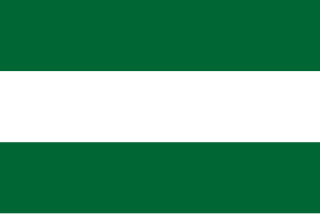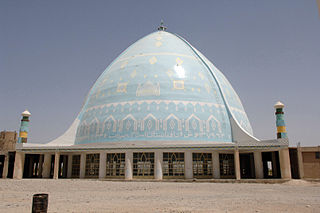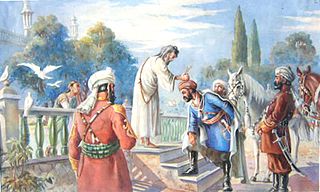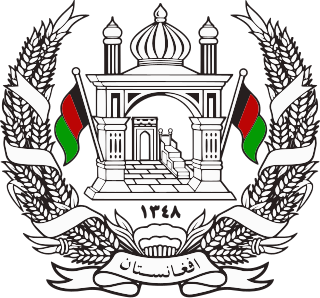Related Research Articles

Ahmad Shāh Durrānī, also known as Ahmad Shāh Abdālī, was the founder of the Durrani Empire and is often regarded as the founder of the modern Afghanistan. In June 1747, he was appointed as King of the Afghans by a loya jirga in Kandahar, where he set up his capital.

The Durrani Empire or the Afghan Empire, also known as the Sadozai Kingdom, was an Afghan empire that was founded by Ahmad Shah Durrani in 1747, that spanned parts of Central Asia, the Iranian plateau, and the Indian Subcontinent. At its peak, it ruled over the present-day Afghanistan, much of Pakistan, parts of northeastern and southeastern Iran, eastern Turkmenistan, and northwestern India. Next to the Ottoman Empire, the Durrani Empire is considered to be among the most significant Islamic Empires of the 18th century.

Kandahar is a city in Afghanistan, located in the south of the country on the Arghandab River, at an elevation of 1,010 m (3,310 ft). It is Afghanistan's second largest city after Kabul, with a population of about 614,118. It is the capital of Kandahar Province and the centre of the larger cultural region called Loy Kandahar. Kandahar is the founding city and spiritual center of the Taliban. Despite the capital of Afghanistan being Kabul, where the government administration is based, Kandahar is the seat of power in Afghanistan as the supreme leader and his spiritual advisers are based there. Kandahar has therefore been called the de facto capital of Afghanistan, though the Taliban maintain Kabul is the capital.

Pashtuns, also known as Pakhtuns, or Pathans, are a nomadic, pastoral, Eastern Iranic ethnic group primarily residing in northwestern Pakistan and southern and eastern Afghanistan. They historically were also referred to as Afghans until the ratification of the 1964 Constitution of Afghanistan, which stated anyone with citizenship is Afghan, and the 1970s after the term's meaning had become a demonym for members of all ethnic groups in Afghanistan.

Pashtunistan is a region located on the Iranian Plateau, inhabited by the indigenous Pashtun people of southern Afghanistan and northwestern Pakistan, wherein Pashtun culture, the Pashto language, and Pashtun identity have been based. Alternative names historically used for the region include Pashtūnkhwā (پښتونخوا), Pakhtūnistān, Pathānistān, or simply the Pashtun Belt.

Popalzai or Popalzay, also known as Popal, are Durrani Pashtuns of Afghanistan. The Popalzai are part of the Zirak confederation of Pashtun tribes. The origin of the Abdali forefathers of the Sadozai tribe is probably the Hephthalites. The forefathers of Ahmad Shāh Durrānī, the founder of the Durrani Empire, were from the Sadozai tribe which is a subtribe of the Popalzai. According to Mohan Lal, the Zirak line begins with Sulaiman Zirak Khan, who was the father of Popalzai, Barakzai, and Alakozai. The tribe's origin is Kandahar, Afghanistan. The majority of the Popalzai live in the southern areas of Afghanistan such as in Kandahar, Helmand or Uruzgan. Some members of the Popalzai tribe have migrated with their families to the European Union, North America, and Oceania. Notable members of the Popalzai tribe include Hamid Karzai and his extended family, Karim Popal, Naim Popal, and Khalida Popal.

The Ghiljī also spelled Khilji, Khalji, or Ghilzai or Ghilzay (غرزی), are one of the largest Pashtun tribes. Their traditional homeland is Ghazni and Qalati Ghilji in Afghanistan but they have also settled in other regions throughout the Afghanistan-Pakistan Pashtun belt. The modern nomadic Kochi people are predominantly made up of Ghilji tribes. The Ghilji make up around 20–25% of Afghanistan's total population.

The Durrānī, formerly known as Abdālī (ابدالي), are one of the largest tribes of Pashtuns. Their traditional homeland is in southern Afghanistan, straddling into Toba Achakzai in Balochistan, Pakistan, but they are also settled in other parts of Afghanistan and parts of Khyber Pakhtunkhwa.
Qizilbash or Kizilbash were a diverse array of mainly Turkoman Shia militant groups that flourished in Azerbaijan, Anatolia, the Armenian highlands, the Caucasus, and Kurdistan from the late 15th century onwards, and contributed to the foundation of the Safavid dynasty in early modern Iran.

Mohammadzai, also spelled Moḥammadzay, is a Pashtun sub-tribe or clan of the Barakzai which is part of the Durrani confederacy of tribes. They are primarily centered on Kandahar, Kabul and Ghazni in Afghanistan as well as in the city of Charsadda in neighbouring Pakistan. The Mohammadzai ruled Afghanistan from 1823 to 1978, for a total of 155 years. Their rule ended under Daoud Khan when the Communists took power via a Soviet-backed coup.

The Durrani dynasty was founded in 1747 by Ahmad Shah Durrani at Kandahar, Afghanistan. He united the different Pashtun tribes and created the Durrani Empire. which at its peak included the modern-day Afghanistan, Pakistan, as well as some parts of northeastern Iran, eastern Turkmenistan, and northwestern India including the Kashmir Valley.
Pashtun diaspora comprises all ethnic Pashtuns. There are millions of Pashtuns who are living outside of their traditional homeland of Pashtunistan, a historic region that is today situated over parts of Afghanistan and Pakistan. While the (erstwhile) Pashtunistan is home to the majority of Pashtun people, there are significant local Pashtun diaspora communities scattered across the neighbouring Pakistani provinces of Sindh and Punjab, particularly in their respective provincial capital cities of Karachi and Lahore. Additionally, people with Pashtun ancestry are also found across India; particularly in Rohilkhand, a region in the Indian state of Uttar Pradesh; and in the Indian states of Gujarat and Rajasthan. Outside of South Asia, significant Pashtun diaspora communities are found in the Arab states of the Persian Gulf, the United States, the United Kingdom, Germany, Iran, Australia, Canada, and Russia.

Afghanistan is a multiethnic and mostly tribal society. The population of the country consists of numerous ethnolinguistic groups: mainly the Pashtun, Tajik, Hazara, and Uzbek, as well as the minorities of Aimaq, Turkmen, Baloch, Pashai, Nuristani, Gujjar, Brahui, Qizilbash, Pamiri, Kyrgyz, Sadat, and others. Altogether they make up the Afghan people.

Alakozai is a Pashtun tribe in Afghanistan. They are one of the four tribes of the Zirak tribal confederacy of Durrani Pashtuns.

The Barakzai dynasty also known as the Muhammadzai dynasty ruled modern day Afghanistan from 1823 to 1978 when the monarchy ended de jure under Musahiban Mohammad Zahir Shah and de facto under his cousin Sardar Mohammad Daoud Khan. The Barakzai dynasty was established by Dost Mohammad Khan after the Durrani dynasty of Ahmad Shah Durrani was removed from power. As the Pahlavi era in Iran, the Muhammadzai era was known for its progressivist modernity in which Afghanistan was referred to as the "Switzerland of Asia".

The Pashtun tribes, are tribes of the Pashtun people, a large Eastern Iranian ethnic group who speak the Pashto language and follow Pashtunwali, the social code of conduct for Pashtuns. They are found primarily in Afghanistan and Pakistan and form the world's largest tribal society, comprising over 60 million people and between 350 and 400 tribes and clans. They are traditionally divided into four tribal confederacies: the Sarbani (سړبني), the Bettani (بېټني), the Ghurghusht (غرغښت), the Karlani (کرلاڼي) and a few allied tribes of those that are Ismailkhel, Khel, Ludin, Sakzai, and Zai.
Pashtunization, is a process of cultural or linguistic change in which someone or something non-Pashtun becomes acculturated to Pashtun influence. Pashtuns are the largest ethnic group in Afghanistan and second-largest in Pakistan.

Pashtun nationalism is an ideology that claims that the Pashtuns form a distinct nation and that they should always be united to preserve their culture and homeland. In Afghanistan, those who advocate Pashtun nationalism favour the idea of a "Greater Afghanistan", which includes Khyber Pakhtunkhwa, and be ruled directly under Pashtun principles.

Bārakzai is the name of a Pashtun tribe from present-day, Kandahar, Afghanistan. '"Barakzai" is a common name among the Pashtuns and it means "son of Barak" in Pashto. According to the Encyclopædia Iranica, "In the detailed Pashtun genealogies there are no fewer than seven instances of the ethnic name Bārakzī, at very different levels of tribal segmentation. Six of them designate simple lineages within six different tribes located in the Solaymān mountains or adjacent lands... The seventh instance, on the other hand, designates one of the most important Pashtun tribes in numbers and historic role, part of the Zīrak branch of the Dorrānay confederation.

Afghan Qizilbash are a Turkic ethnic group in Afghanistan. The Afghan Qizilbash are descendants of the Qizilbash, which were a militant group mostly made up of Turkomans. Their language is Dari. They follow Twelver Shia Islam.
References
- ↑ Noelle, Christine (25 June 2012). State and Tribe in Nineteenth-Century Afghanistan: The Reign of Amir Dost Muhammad Khan (1826-1863). ISBN 9781136603174.
- ↑ Estrin, James (February 4, 2013). "A Hard Life on the 'Roof of the World'". The New York Times.[ verification needed ]
- ↑ "Wak.p65" (PDF). Retrieved 2013-02-28.[ verification needed ]